| Listing 1 - 10 of 21 | << page >> |
Sort by
|
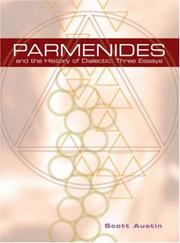
ISBN: 1282256122 9786612256127 1930972539 9781930972537 9781282256125 9781930972193 1930972199 6612256125 Year: 2007 Publisher: Las Vegas [Nev.] : Parmenides Pub.,
Abstract | Keywords | Export | Availability | Bookmark
 Loading...
Loading...Choose an application
- Reference Manager
- EndNote
- RefWorks (Direct export to RefWorks)
Dialectic. --- Polarity --- Polarity (Philosophy) --- Parmenides. --- Dialectique
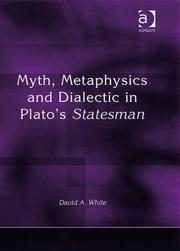
ISBN: 9780754657798 0754657795 9781315597164 1315597160 1317090853 1317090845 1281208566 9786611208561 0754687317 Year: 2007 Publisher: Aldershot Ashgate
Abstract | Keywords | Export | Availability | Bookmark
 Loading...
Loading...Choose an application
- Reference Manager
- EndNote
- RefWorks (Direct export to RefWorks)
Plato's dialogue The Statesman has often been found structurally puzzling by commentators because of its apparent diffuseness and disjointed transitions. In this book David White interprets the dialogue in ways which account for this problematic structure, and which also connect the primary themes of the dialogue with two subsequent dialogues The Philebus and The Laws.
Plato --- Metaphysics. --- Dialectic. --- Métaphysique --- Dialectique --- Plato. --- Métaphysique --- Polarity --- Polarity (Philosophy) --- Philosophy --- God --- Ontology --- Philosophy of mind
Book
ISBN: 9789085750154 9789044121285 Year: 2007 Publisher: Antwerpen Cyclus
Abstract | Keywords | Export | Availability | Bookmark
 Loading...
Loading...Choose an application
- Reference Manager
- EndNote
- RefWorks (Direct export to RefWorks)
Informatietheorie in de geneeskunde --- Information theory in medicine --- Polariteit (Geneeskunde) --- Polariteittherapie --- Polarity (Medicine) --- Polarity therapy --- Polarité (Médecine) --- Polarité thérapeutique --- Therapie [Polariteit] --- Therapy [Polarity ] --- Théorie de l'information en médecine --- Thérapeutique par polarité --- Physiotherapy. Alternative treatments --- polariteit --- alternatieve geneeswijzen
Book
ISBN: 9783777615875 3777615870 Year: 2007 Volume: 140/4 Publisher: Stuttgart : Hirzel,
Abstract | Keywords | Export | Availability | Bookmark
 Loading...
Loading...Choose an application
- Reference Manager
- EndNote
- RefWorks (Direct export to RefWorks)
Reformation --- Polarity --- Religious aspects --- Christianity --- Luther, Martin, --- Reformation - Germany - Wittenberg (Saxony-Anhalt) --- Polarity - Religious aspects - Christianity --- Réforme --- Allemagne --- Wittenberg (allemagne) --- Histoire religieuse --- 16e siècle
Book
ISSN: 07213417 ISBN: 3631555806 9783631555804 Year: 2007 Publisher: Frankfurt am Main Peter Lang
Abstract | Keywords | Export | Availability | Bookmark
 Loading...
Loading...Choose an application
- Reference Manager
- EndNote
- RefWorks (Direct export to RefWorks)
Dialectic --- Sex --- Gender (Sex) --- Human beings --- Human sexuality --- Sex (Gender) --- Sexual behavior --- Sexual practices --- Sexuality --- Sexology --- Polarity --- Polarity (Philosophy) --- Hegel, Georg Wilhelm Friedrich,
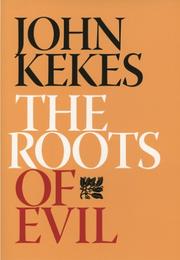
ISBN: 0801443687 9780801471308 0801471303 9780801471315 0801471311 9780801473814 0801473810 9780801473814 9780801443688 132252310X Year: 2007 Publisher: Ithaca, N.Y. Cornell University Press
Abstract | Keywords | Export | Availability | Bookmark
 Loading...
Loading...Choose an application
- Reference Manager
- EndNote
- RefWorks (Direct export to RefWorks)
"Evil is the most serious of our moral problems. All over the world cruelty, greed, prejudice, and fanaticism ruin the lives of countless victims. Outrage provokes outrage. Millions nurture seething hatred of real or imagined enemies, revealing savage and destructive tendencies in human nature. Understanding this challenges our optimistic illusions about the effectiveness of reason and morality in bettering human lives. But abandoning these illusions is vitally important because they are obstacles to countering the threat of evil. The aim of this book is to explain why people act in these ways and what can be done about it."-John Kekes The first part of this book is a detailed discussion of six horrible cases of evil: the Albigensian Crusade of about 1210; Robespierre's Terror of 1793-94; Franz Stangl, who commanded a Nazi death camp in 1943-44; the 1969 murders committed by Charles Manson and his "family"; the "dirty war" conducted by the Argentinean military dictatorship of the late 1970's; and the activities of a psychopath named John Allen, who recorded reminiscences in 1975. John Kekes includes these examples not out of sensationalism, but rather to underline the need to hold vividly in our minds just what evil is. The second part shows why, in Kekes's view, explanations of evil inspired by Christianity and the Enlightenment fail to account for these cases and then provides an original explanation of evil in general and of these instances of it in particular.
Good and evil. --- Evil --- Wickedness --- Ethics --- Philosophy --- Polarity --- Religious thought --- General ethics
Dissertation
ISBN: 9789036732703 Year: 2007 Publisher: Enschede Ipskamp
Abstract | Keywords | Export | Availability | Bookmark
 Loading...
Loading...Choose an application
- Reference Manager
- EndNote
- RefWorks (Direct export to RefWorks)
Cell Membrane --- Central Nervous System --- Myelin Sheath --- Cell Polarity --- metabolism --- physiology
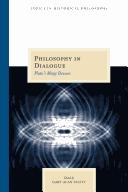
ISBN: 9780810123564 9780810123540 0810123568 0810123541 Year: 2007 Publisher: Evanston, Ill. : Northwestern University Press,
Abstract | Keywords | Export | Availability | Bookmark
 Loading...
Loading...Choose an application
- Reference Manager
- EndNote
- RefWorks (Direct export to RefWorks)
Dialectic. --- Dialectique --- Plato. --- Dialectic --- Polarity --- Polarity (Philosophy) --- Aflāṭūn --- Aplaton --- Bolatu --- Platon, --- Platonas --- Platone --- Po-la-tʻu --- Pʻŭllatʻo --- Pʻŭllatʻon --- Pʻuratʻon --- Πλάτων --- אפלטון --- פלאטא --- פלאטאן --- פלאטו --- أفلاطون --- 柏拉圖 --- 플라톤 --- Plato --- Platon --- Platoon --- Платон --- プラトン
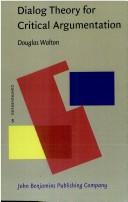
ISBN: 1282152653 9786612152658 9027292000 9789027292001 9027218854 9789027218858 9789027218858 Year: 2007 Publisher: Amsterdam Philadelphia John Benjamins Pub.
Abstract | Keywords | Export | Availability | Bookmark
 Loading...
Loading...Choose an application
- Reference Manager
- EndNote
- RefWorks (Direct export to RefWorks)
Because of the need to devise systems for electronic communication on the internet, multi-agent computing is moving to a model of communication as a structured conversation between rational agents. For example, in multi-agent systems, an electronic agent searches around the internet, and collects certain kinds of information by asking questions to other agents. Such agents also reason with each other when they engage in negotiation and persuasion. It is shown in this book that critical argumentation is best represented in this framework by the model of reasoned argument called a dialog, in which two or more parties engage in a polite and orderly exchange with each other according to rules governed by conversation policies. In such dialog argumentation, the two parties reason together by taking turns asking questions, offering replies, and offering reasons to support a claim. They try to settle their disagreements by an orderly conversational exchange that is partly adversarial and partly collaborative.
Dialectic. --- Logic. --- Reasoning. --- Argumentation --- Ratiocination --- Reason --- Thought and thinking --- Judgment (Logic) --- Logic --- Deduction (Logic) --- Deductive logic --- Dialectic (Logic) --- Logic, Deductive --- Intellect --- Philosophy --- Psychology --- Science --- Reasoning --- Polarity --- Polarity (Philosophy) --- Methodology
Book
ISBN: 9789044121704 Year: 2007 Publisher: Antwerpen Garant
Abstract | Keywords | Export | Availability | Bookmark
 Loading...
Loading...Choose an application
- Reference Manager
- EndNote
- RefWorks (Direct export to RefWorks)
De filosofie wordt gedreven door een verlangen naar waarheid. Eenvoudig is dat niet. Dagelijks stellen filosofen ? en andere wetenschappers ? vast dat ze zich kunnen vergissen. Wat is waarheid en waar kunnen we ze vinden? Het is een oude vraag die nog steeds actueel blijft. Luc Taccoen, filosoof en klinisch psycholoog, stelt dat het de mens verboden is om op de plaats van de waarheid te gaan staan. De mens is verplicht te leven in de paradox: fervent naar de waarheid te zoeken, maar zich nooit vestigen op de plaats van de waarheid. Wanneer de mens de waarheid meent te hebben gevonden, zal die in haar tegendeel omkeren tot macht, geweld of uitbuiting. Op de plaats van de waarheid wordt de waarheid een leugen. Het goede wordt dan vervormd tot kwaad, denk maar aan Adam en Eva, het drama van Oedipus of het verhaal van een tiran als Hitler. De hele geschiedenis van de filosofie werd met dit euvel geplaagd.
Theory of knowledge --- #KVHB:Psychoanalyse --- #KVHB:Psychopathologie --- Psychoanalyse ; ethiek. --- Good and evil --- Evil --- Wickedness --- Ethics --- Philosophy --- Polarity --- Religious thought
| Listing 1 - 10 of 21 | << page >> |
Sort by
|

 Search
Search Feedback
Feedback About UniCat
About UniCat  Help
Help News
News